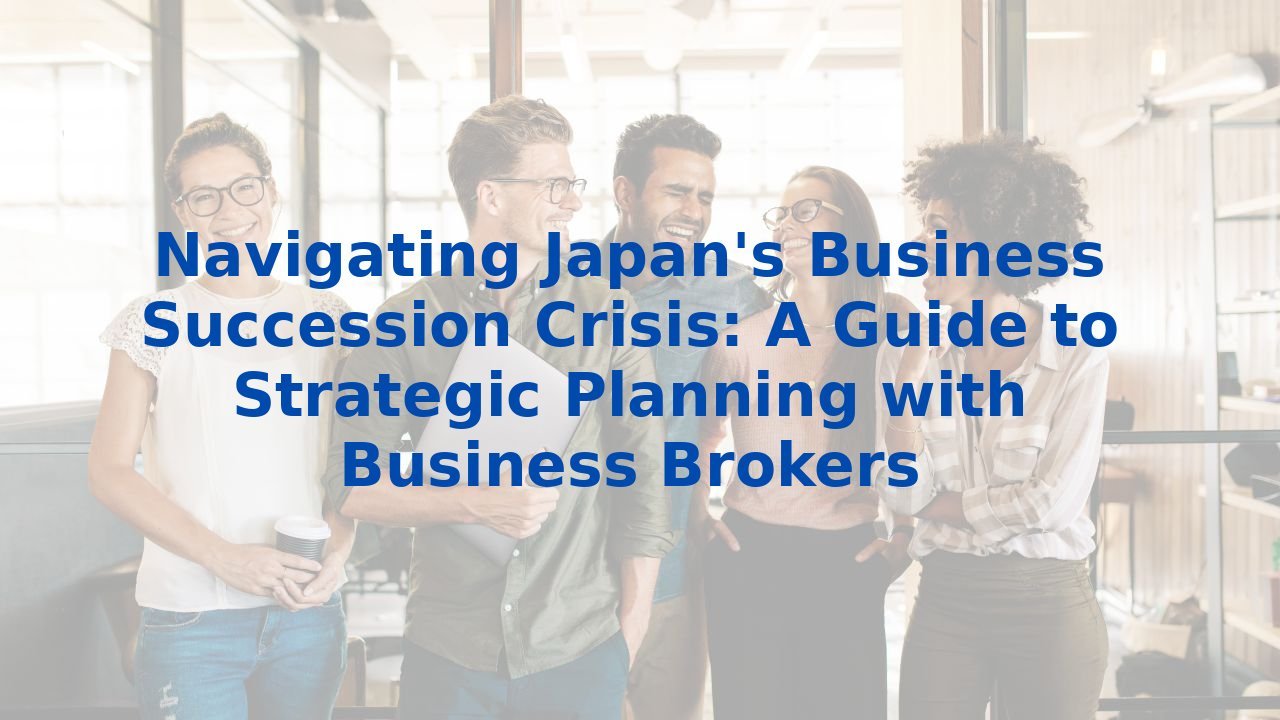Navigating Japan's Business Succession Crisis: A Guide to Strategic Planning with Business Brokers
Navigating Japan's Business Succession Crisis: A Guide to Strategic Planning with Business Brokers
Introduction
The landscape of Japan's business environment is currently grappling with a significant challenge: a business succession crisis. As many business owners approach retirement without a clear plan for passing on their enterprises, it's crucial to explore strategic planning avenues. This is where the role of business brokers becomes pivotal, and the influence of artificial intelligence (AI) in streamlining the process cannot be overlooked. In this guide, we’ll delve into how organizations can effectively navigate this crisis while leveraging AI to enhance efficiency in their business processes.
Understanding the Crisis and the Role of Business Brokers
The gap left by retiring business owners often results in unstable operations, loss of knowledge, and missed opportunities for growth. Business brokers play a vital role in facilitating smooth transitions, connecting potential buyers with sellers, and ensuring that businesses are not only sold but sold to the right people who can continue the legacy. Their expertise helps navigate the intricacies of valuation, negotiation, and due diligence, fostering an environment of trust that is essential in such emotionally charged transactions.
AI: A Game Changer in the Succession Process
Integrating AI into the succession planning process offers unprecedented advantages. Through enhanced data analysis and process optimization, organizations can ensure that their succession strategies are not only documented but actionable, allowing for seamless transitions in leadership and management.
Process Discovery and Analysis
AI’s capability for process discovery allows businesses to unravel their existing operations—identifying inefficiencies that may hinder succession planning. AI employs advanced algorithms, such as pattern recognition and natural language processing, to sift through enormous datasets and provide actionable insights. This clarity helps both business owners and brokers understand precisely where value lies in a company, making it easier to articulate that value to prospective buyers.
Process Mapping for Strategic Decisions
Once inefficiencies are uncovered, AI can assist in process mapping to visualize workflows, identify bottlenecks, and optimize operations. This method not only clarifies the current state of operations but also highlights areas that may require attention before entering into a succession plan. Business brokers armed with AI-generated maps can facilitate more informed discussions with stakeholders, smoothing the path to negotiation.
Automation: Reducing Manual Workloads
The power of automation, especially through Robotic Process Automation (RPA), allows businesses to offload repetitive tasks such as data entry and report generation. By automating these mundane tasks, companies can refocus their efforts on critical strategic decision-making. This allows owners to spend more time thinking about their succession strategy rather than getting bogged down in day-to-day operations.
The Predictive Edge: Risk Management
Succession planning inherently includes risk assessment, and AI excels at predictive analytics. Businesses can leverage AI to model potential scenarios, analyzing the impact of different succession strategies. By anticipating challenges before they arise, organizations can prepare adequately—this foresight is a significant advantage for brokers when discussing business valuations and future potential with prospects.
Enhancing Decision-Making with AI
AI doesn’t just streamline processes; it enhances decision-making. By processing vast amounts of data at impressive speed, AI empowers business leaders to make informed choices grounded in data-driven insights rather than intuition alone. This analytical prowess is particularly beneficial during succession planning, as it aids in identifying the best successors or buyers based on past performance and future potential.
Employee Training: The Human Element
While AI tools are impressive, the human element can’t be ignored. Empowering employees with training focused on AI utilization is pivotal. Understanding AI tools allows teams to make the most of these technologies and adapt to changes swiftly. Training not only facilitates the smooth integration of AI into existing workflows but also enhances employees' capability to make sense of data, fostering an environment where proactive decision-making thrives.
Conclusion
Navigating Japan's business succession crisis is undoubtedly complex, but with the guidance of business brokers and the integration of AI tools, organizations can transform this challenge into an opportunity. By embracing strategic planning, refining processes through AI, and investing in employee training, businesses can ensure a smoother transition and long-term sustainability. Embracing AI doesn't just enhance efficiency; it fosters resilience in a changing landscape, paving the way for future success.



